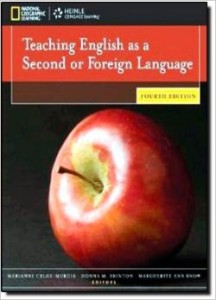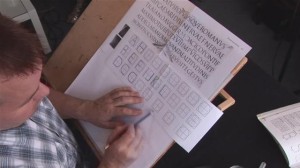I’m taking a course called “Teaching English to Speakers of Other Languages” (INTD 388, I highly recommend it) with Professor Belyakov. Our textbook, Teaching English as a Second or Foreign Language (4th ed) by Marianne Celce-Murcia and some of her buddies, has a short section on plagiarism that reminded me of the Lessig, Turrow, Helprin, and Jefferson readings on copyright. This excerpt comes from a chapter called “Considerations for Teaching Second Language Writing,” which covers some of the challenges of working with non-native English speakers, some of whom will have very basic issues (like learning how to form the graphemes of the Roman alphabet) and others who will struggle with more complex problems (like transferring organizational writing skills from their first language to English). Thus saith the textbook:

“Research suggests that many students have difficulty with sentence simplification and paraphrasing without changing the author’s original intent; furthermore, some students consider copying a legitimate strategy for composing (Shi, 2004). Similar cultural issues regarding the use of a source text language have been noted by Pennycook (1996), who was among the first to point out that the idea that individuals “own” ideas and words is a peculiarly Western notion that may not be prevalent in other cultures. […] Learning to identify and avoid inappropriate textual borrowing is clearly an important part of the writing classroom and the teacher should avoid framing it as a moral issue” (227-228).
As a tutor at the Writing Learning Center (come visit me! I work Tuesdays, Wednesdays, and Thursdays!), I often encounter writing from international students who have pretty blatantly plagiarized. One part of their paper will have a predictable amount of errors, and all of a sudden, the next paragraph is written in perfect English. How do you address something like that? I don’t want to accuse them of plagiarism flat-out… that’s a very serious accusation, one that could even resort in expulsion. So instead, I usually say “This paragraph is excellent – you expressed your ideas very clearly here,” and I hope that this will prompt them to say, “Yeah, I used the Internet to help me a lot with that one…”

(My mother taught me well in the art of guilt-tripping.) Once they say something like this, it opens a dialogue about how to properly cite sources and how to balance your voice with another author’s voice. Sometimes, though, all I get is “Thanks.” And even though I consider myself an honorary member of the moral police, at that point I just have to move on with the tutoring.
So Pennycook wants to make the claim that lifting or actually plagiarizing is a Western invention? To be frank, I don’t know how much of that I buy. I can’t imagine a student in China getting an A on a paper if the teacher knew they copied half of it verbatim from another source. An article entitled “Is there such a thing as Asian plagiarism?” looks at a few specific cases, and concludes that Asian students are indeed taught citation conventions and often plagiarize not out of naivete, but out of stress from the academic environment.
I do, however, think looking at an issue like this puts the four aforementioned readings in perspective. How ridiculous is it that Americans are willing to spend literally millions of dollars suing someone for five seconds of a Simpsons episode (when you can probably stream that whole episode, illegally, online, for free…) or on the Causby asininity when there are people who are actually taking full paragraphs of someone else’s exact words and handing it in, as their own, in order to get a college degree? So what if a TV show is a “bigger deal” than one student’s term paper? The offense should matter more than the scale on which it occurs. I hope this is what Pennycook is talking about when he says other cultures don’t understand our fixation with privatizing ideas. Verbal plagiarism, though, or when one person/corporation clearly steals a developing idea/invention from another? That is a different story, and that’s the story I think Lessig and Jefferson need to turn their attention to. The same way we shouldn’t characterize a religion by the actions of its extremist, let’s not condemn the whole concept of copyrights based on the travesty some Americans have made out of it.

I really want to get on board with Celce-Murcia, because her passage sounds so sensitive and culturally-aware, and who doesn’t want to be those things? But I feel like she’s not taking this seriously enough. Would she be this understanding if someone plagiarized from her book? If she were talking about ‘copying’ in the context of one of the crazy examples Lessig gives, I would understand; but she’s talking about not punishing someone for stealing words verbatim without giving credit, on the grounds that they probably didn’t understand it was wrong. I am struggling to wrap my mind around this. Maybe it’s just because I’m ignorant. But the thing I agree least with among all Celce-Murcia’s claims, is that teachers should not consider it a moral issue. Serious, large-scale plagiarism is the paragon of a moral issue. And if for some reason the student sincerely doesn’t know it’s morally wrong… sorry to be such a racist, but then they have to learn that it’s morally wrong here! I wouldn’t expect to go to China and get free passes for doing things that are morally wrong there (especially if every class made me aware that it is wrong in the syllabus). Maybe the consequences shouldn’t be as serious as they’d be for an American student, but I’d say the situation would warrant at bare minimum a verbal warning.
Like I tell my clients at the Writing Learning Center – using other people’s ideas is completely fine. Just like Lessig points out numerous times, that’s the fabric on which almost all great inventions, innovations, and art has been based. But you do need to acknowledge that you’re getting the information from somewhere else, properly credit the original source, and make sure to put a substantial amount of your own voice into the work.

In all fairness, though, I have to end by acknowledging that second language acquisition is a terribly difficult, and often disheartening, process. Since I am majoring in a foreign language, I know what it’s like to go from being a verbal Olympic gymnast in your mother tongue to a toddler trying to walk in your second language. Because I have been brought up in a culture where plagiarism is strictly forbidden, I am never tempted to lift passages from other works… but man, it sure would be nice to find a way to express my thoughts in French as eloquently as I could express them in English, so I am sympathetic to students who have the same feeling but not necessarily the same background.
And if you can’t find the right words in your own voice, sometimes jumping gets your point across just fine:
